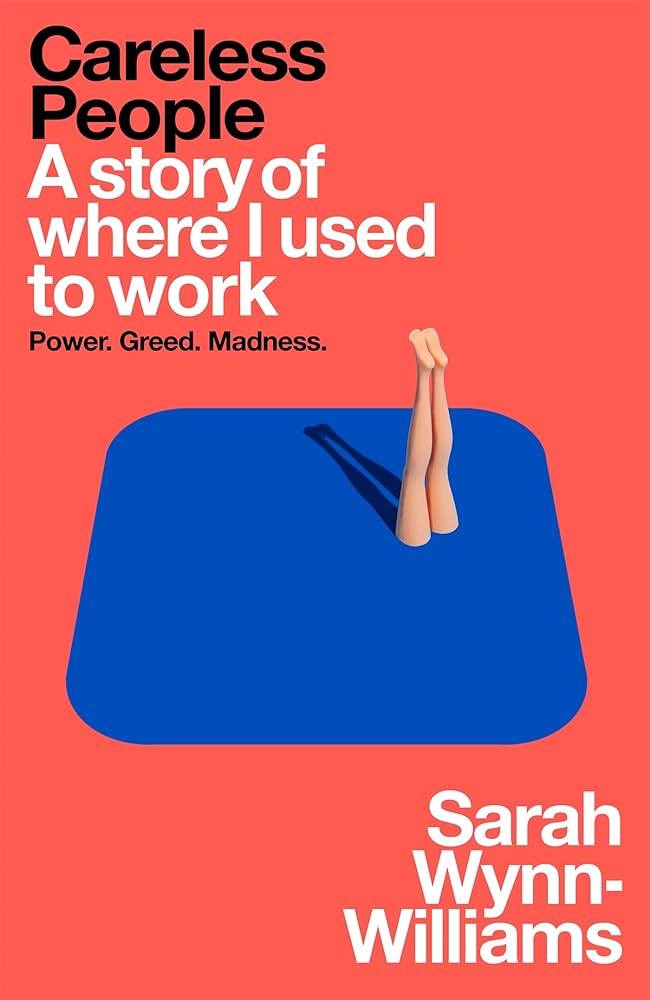Careless People: The explosive memoir that Meta doesn’t want you to read
£11.40
The instant Sunday Times bestseller
#1 New York Times bestseller
‘How else to put this? – bloody hell’ Guardian
‘Devastating . . . funny . . . highly enjoyable’ The Times
‘Jaw-dropping . . . A tell-all tome’ Financial Times
‘Amazing: of all the books in all the world Mr Free Speech Zuckerberg wants to ban, it’s the one about him’ Marina Hyde
Sarah Wynn-Williams, a young diplomat from New Zealand, pitched for her dream job. She saw Facebook’s potential and knew it could change the world for the better. But, when she got there and rose to its top ranks, things turned out a little different.
From wild schemes cooked up on private jets to risking prison abroad, Careless People exposes both the personal and political fallout when boundless power and a rotten culture take hold. In a gripping and often absurd narrative, Wynn-Williams rubs shoulders with Mark Zuckerberg, Sheryl Sandberg and world leaders, revealing what really goes on among the global elite – and the consequences this has for all of us.
Candid and entertaining, this is an intimate memoir set amid powerful forces. As all our lives are upended by technology and those who control it, Careless People will change how you see the world.
‘A Bridget Jones’s Diary-style tale of a young woman thrown into a series of improbable situations’ The Times
‘Darkly funny and genuinely shocking: an ugly, detailed portrait of one of the most powerful companies in the world’ The New York Times
Read more
Additional information
| Publisher | Macmillan (13 Mar. 2025) |
|---|---|
| Language | English |
| File size | 1.0 MB |
| Text-to-Speech | Enabled |
| Screen Reader | Supported |
| Enhanced typesetting | Enabled |
| X-Ray | Not Enabled |
| Word Wise | Enabled |
| Print length | 390 pages |



by Kirk McElhearn
Pretty much everyone knows how evil Facebook is, but the story has never been told in such detail. To the point that Facebook has tried to prevent its publication. The author, former Director of Global Public Policy at Facebook, was privy to a lot of the main decisions as the company grew. It didn’t take long before she realized that:
“most days, working on policy at Facebook was way less like enacting a chapter from Machiavelli and way more like watching a bunch of fourteen-year-olds who’ve been given superpowers and an ungodly amount of money, as they jet around the world to figure out what power has bought and brought them.”
Wynn-Williams tells us about many of the scandals that we’ve read about. The Myanmar genocide, fueled by Facebook, the targeting of vulnerable teenagers to display ads when they were at their worst, and Facebook’s attempts to enter the Chinese market, even secretly creating shell companies to release apps in China, while negotiating with the Chinese government to provide surveillance tools.
What I have trouble understanding is how she continued working with sociopaths after the first few years, when it was obvious that they wouldn’t change. As she rose in the company, and spent time with “Mark” and “Sheryl,” it was clear that these two people, as well as others, don’t care about the consequences of their platform.
In the end, she is fired after being harassed by her boss, but not after sticking with the company because she needed health insurance for her young children – this is a woman who was literally just about to give birth to her first child, her feet in the stirrups, and was composing an email with talking points for Davos – and in order to benefit from stock options. So while her story shows someone who says the following, she had plenty of opportunities to leave before things came to a head:
“I keep telling myself I can do more to change things inside than I can out. So I’m trying to work the rotten system to achieve what little I can to make things better.”
In the end, she realizes that these tech broligarchs (and one sisigarch) don’t care about anyone but themselves. Their wealth has made them immune.
“Instead of fixing these things, this ongoing suffering they caused, they seem indifferent. They’re happy to get richer and they just don’t care. It feels crude to put it that way, but it’s true. They profit from the callous and odious things they do. Which seems so crazy. They could’ve tried to fix these things and still been insanely rich and powerful. They were in the rare situation where the money was there in abundance. They could have afforded to do the right thing. They could have told the truth. They could have exercised basic human decency. It was all within their power.”
It’s a fascinating story, but it leaves me wondering what is left out.
by Charlotte
A great book – I wasn’t shocked by the institutional evil (which we are unfortunately so numb to now) but the depictions of absolutely sociopathic behaviour from senior staff at Facebook were pretty astounding.
by customer
Absolutely brilliant, engaging and increasingly dark and creepy towards the end account of her experience of working for Facebook. I admire author’s resilience and bravery to publish this book, which provides such an important prospective on the current events and the directions the world is taking. A must read.
by mosscottage
This book is entertaining and horrifying in equal measures. (You’ll need a strong stomach towards the end when reading about Facebook’s influence in Myanmar.)
Obviously we all knew Facebook was pretty evil, but this in-depth exposé written by someone who was there, tells us in detail exactly how and why.
As the book goes on, I will say that the writer’s shtick of trying to shake off as much responsibility as possible (she claims naïveté for a long time, then when it’s clear she can’t be that naive any more she pivots to suggesting she’s trying to change the company from within; finally she says she needs the health insurance) does start to wear a little thin. If this were a work of fiction the trope would be that of the ‘unreliable narrator’.
That said – perhaps it mirrors our own positions. We know Meta is irredeemable and responsible for some utterly horrific stuff yet many of us continue to use Facebook/Facebook Messenger, and/or Instagram and/or WhatsApp for a variety of reasons. I find it especially hard to extricate myself from WhatsApp, though I’ve drastically cut down on the other platforms (though have not – yet – permanently deleted my profiles). Maybe it’s easier to point the finger at Wynn-Williams than look at our own behaviours?
by Julia
If you, like me, didn’t really follow FB story, coverage and investigations into it, then it is a must read for you. The book is full of shocking facts. It is also well written and reads as a thriller. What a shame – to have this power and to use it so poorly. It was painful to read about insensitivity and hypocrisy, about Sheryl Sandberg pretending to be a feminist (although that wasn’t news I could not imagine the scope of phoniness), and the authors physical struggles and her bosses indifference. It was disgusting to read about how FB is preying on vulnerable teens and selling their low points to the highest bidders.
I do not have any illusions that we will see a change, for sure not in 2025, but maybe one day. And when that day comes, this will be a milestone book.
by Bhavishya
I bought this book thinking it will tell me how far e book as an organisation worked and contributed towards things they don’t want to associate with.
However found it to be a tale of a women employee coping with employers. If you don’t like it leave it. It’s your choice. You keep clinging to a pillar and say it’s not leaving you….
by Kindle Customer
This book is incredible in unmasking the dark abyss which is Facebook leadership. All fit the definition of evil found by the leading psychologist of the Nuremberg trials:
“In my work with the defendants (at the Nuremberg Trials 1945-1949) I was searching for the nature of evil and I now think I have come close to defining it. A lack of empathy. It’s the one characteristic that connects all the defendants, a genuine incapacity to feel with their fellow men.
Evil, I think, is the absence of empathy.”
-Captain G. M. Gilbert, the Army psychologist assigned to watching the defendants at the Nuremberg trials
by Akhilesh K.
It provides an insightful look into Facebook’s operations during her time as Director of Global Public Policy from 2011 to 2017. Her narrative combines humor and sharp observations, making complex corporate dynamics accessible and engaging. She discusses the ethical challenges and personal sacrifices she faced, including the tension between corporate growth and personal values, particularly regarding attempts to expand into China. She also touches on balancing motherhood with her career, highlighting the gender dynamics within the tech industry. The memoir does a great job in capturing the dangers of concentrated power in tech giants and their impact on society
by Silver
Absolutely fascinating and very well written
I would recommend to anyone who is curious about how big companies really work at the top level.
by Idiare
Sarah has done the world a great service with this book, it was difficult to read in parts because of the scale of flippancy the decisions a business has on real life issues. I highly recommend it.
by Angel
Brilliant informative and scary all at once. Could not put book down. How Facebook manipulates a whole generation and whole countries
by Akhilesh K.
An eye opener! Will not be using meta anymore anyhow. Amazed at the lack of conscience, the excessive greed and the ability of some humans to prey on others
by Mike Duncan
An informative and enlightening read.
Facebook and their leadership come away as meglomanics.
The author highlights a lot of new scandals.
It will be interesting to see if Facebook does eventually face some type of accounting or regulatory control.